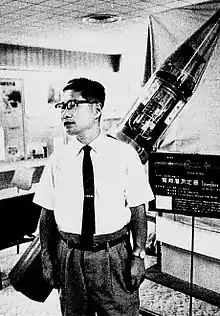Hideo Itokawa
Hideo Itokawa (糸川 英夫, Itokawa Hideo, July 20, 1912 – February 21, 1999) was a pioneer of Japanese rocketry, popularly known as "Dr. Rocket," and described in the media as the father of Japan's space development.[1][2][3]
Hideo Itokawa | |
|---|---|
糸川 英夫 | |
 Hideo Itokawa (1961) | |
| Born | July 20, 1912 Tokyo |
| Died | February 21, 1999 (aged 86) |
| Nationality | Japanese |
| Education | Tokyo Imperial University |
| Known for | The father of Japanese space development |
| Scientific career | |
| Fields | Rocketry |
| Institutions | Imperial University of Tokyo |
The near-Earth asteroid 25143 Itokawa, named in honor of Itokawa,[4] is notable as the target of the Hayabusa mission.
Biography
Born in Tokyo, Itokawa skipped grades in school and graduated from the Tokyo Imperial University in 1935, having majored in aeronautical engineering. In 1941, he became an assistant professor of the Imperial University of Tokyo. During World War II, he was involved in designing aircraft at the Nakajima Aircraft Company and designed the Nakajima Ki-43 Hayabusa ("Peregrine Falcon"; Allied reporting name "Oscar") fighter.
Itokawa became a full professor in 1948. In 1955 Itokawa worked on the Pencil Rocket for Japan's space program. He retired from his post at the university in 1967 and established an institute.
Itokawa wrote 49 books, and was many times a best-selling author. Topics that Itokawa became interested in or took as a hobby, include such sports as basketball, golf and swimming, as well as orchestral arrangements and such instruments as cello, harmonica, organ, piano, violin and taishōgoto (a string instrument invented in Japan). He was also interested in baton twirling, brain waves, English plays, Mah Jong, philosophy, rocket engineering and novel writing.
Bibliography
- Gyakuten no Hasso
- Hachijussai no Aria
- Koya wo Yuku
References
- Kirkup, James (19 March 1999). "Obituary: Hideo Itokawa". The Independent. Retrieved 20 March 2017.
-
- Japan-An Illustrated Encyclopedia, Kodansha, Tokyo, 1993, p. 638
- "Prof. Itokawa, "The Father of Japanese Rocketry"". History of Japanese Space Research. Institute of Space and Astronautical Science. Retrieved 20 March 2017.
- "Official Approval of Names on ITOKAWA by IAU". Press Release of JAXA. 3 March 2009.